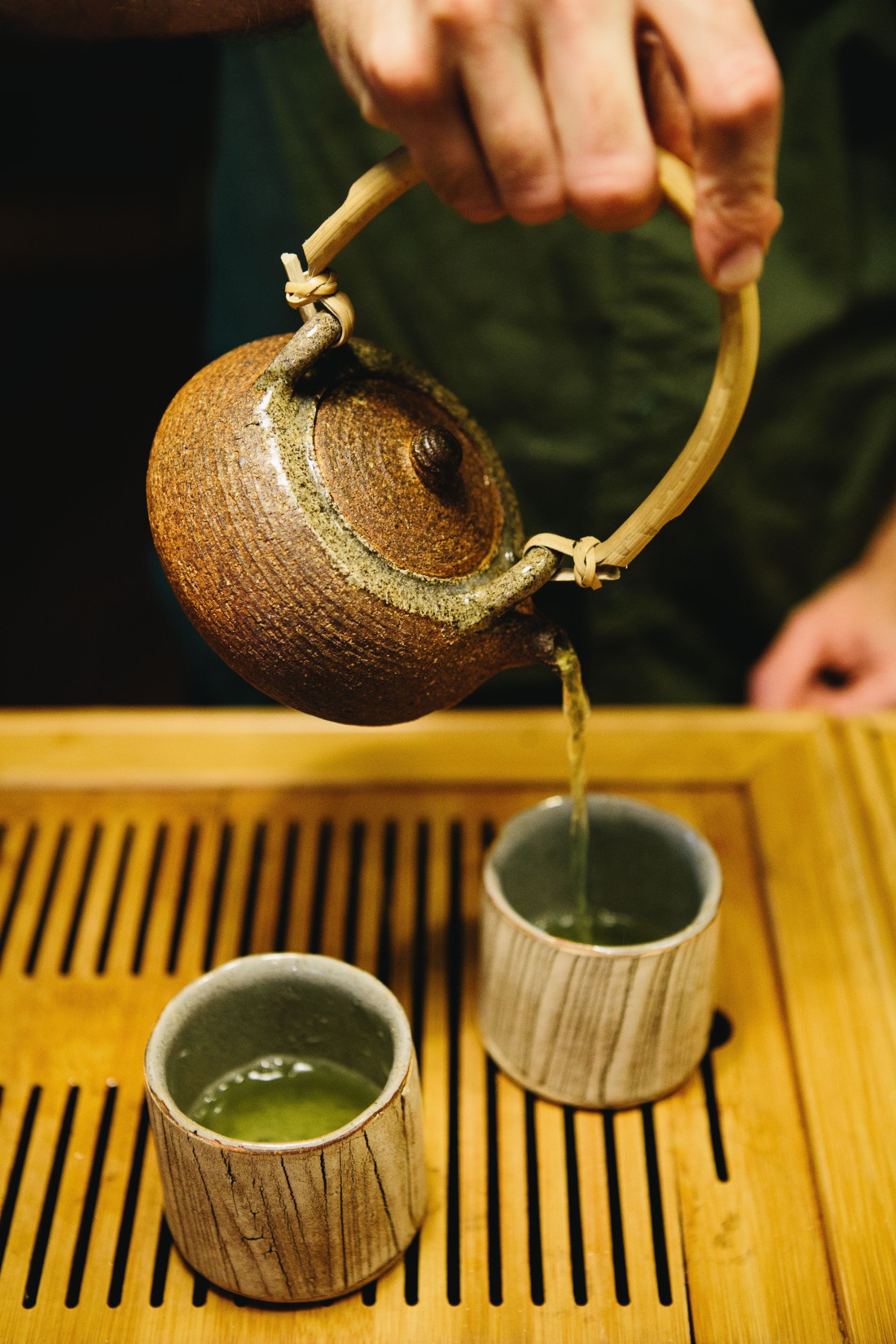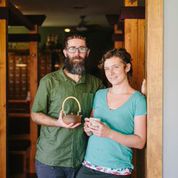Western North Carolina’s coffee culture is alive and thriving, with a seemingly ever-expanding array of coffee dispensaries — including shops, roasters, coffee trucks and drive-thru options. If you look closely, though, you’ll notice that another contender — the oldest and most prevalent beverage on earth, apart from plain old H2O — is gradually becoming more prominent here.
As we slowly shift from summer into fall, reaching for a cup of tea to warm the fingers and the spirit becomes a common practice around Asheville. Growing numbers of local businesses now feature lovely countertop arrangements of glass jars filled with assorted loose-leaf teas. More specialized enterprises include Panther Moon Tea Co. in West Asheville and Dobra Tea, with locations in downtown Asheville and Black Mountain.
Frequent trips to China, Taiwan, Japan, India and Sri Lanka, notes Dobra co-owner Andrew Snavely, enable his business to maintain personal relationships with the farmers who grow each variety, ensuring that all of the teahouse’s offerings are of the highest quality.
“Each year, either myself or someone from the company goes to a different tea country to either meet with people we’ve already established relationships with or discover new varieties. We go to different mountains, and discover and taste new varieties of teas that are now being processed,” says Snavely. “We usually come home with suitcases and suitcases of tea that will last us a couple of months.”
In February, for example, Snavely plans to pop over to Sri Lanka to visit some of Dobra’s black tea suppliers and conduct a bit of research. “We do all our own importing twice a year, so everything is as fresh as it can be,” he explains. Once a variety is chosen, Dobra staff will taste all the different options and select one, based on quality and price. “We have a broker, and each garden or tea plantation that we do business with has to abide by FDA regulations to allow their products to come into our country.”
What can patrons expect to discover at Dobra at this time of year? “As we come into fall, everything is definitely fresh,” says Snavely as we sip a honeyed oolong that recently arrived from the Mae Salong region of northern Thailand. “May, June and July is when the bulk of our harvest comes in. That holds us through the wintertime and into spring, when everything comes in fresh again.” Nothing served at Dobra is more than 1 year old, except for aged pu-ehr teas and oxidized fermented teas. “I like to say that tea harvest time is spring and summer, but tea drinking time, for most, tends to be fall and winter,” Snavely observes.
Fresh tea, he explains, “has a lot more beneficial properties than when you take a leaf, crush it up and put it in a tea bag. Just because a tea has more oxidation doesn’t mean it’s more nutritious or has more caffeine. You can have a very tippy, very high-quality green tea that’s more caffeinated than a fully oxidized black tea that’s not as tippy.” Tippy means the harvest was particularly abundant in young leaf tips. “Oxidation,” continues Snavely, “has a lot to do with caffeine, but freshness is the most important factor in the amount of nutrients.” Recommended end-of-summer-harvest teas currently available at Dobra include maojian, a Chinese green tea; jinshuan, a milk oolong from Taiwan; and baihao oolong.
Pu-erh teas, an exception to the “fresher is better” rule, undergo a fermentation process that can take up to 30 years. Panther Moon owner Sumitra D’Aragon offers a variety of both fresh and aged pu-erh teas.
“For me, ripe [aged and fermented] pu-erh is very grounding and very nourishing. In the old days in China, only the elders would drink ripe pu-erh tea, because it’s so good for you. All that beneficial bacteria is good for your heart and your brain,” she says. Fresh, raw pu-erh tea, meanwhile, “is more elevating,” says D’Aragon, but while spring pu-erhs have up-front floral notes, the raw pu-erhs harvested in the fall will be smooth, thick and buttery with complex layers. “What’s prized in a raw pu-erh is a bitterness that transforms into sweet. They say in Chinese medicine that pu-erh is a spiritual tea that opens up the higher centers.”
Dobra Tea, 78 N. Lexington Ave., Asheville; 120 Broadway St., Black Mountain. Dobra teas can also be found at the French Broad Chocolate Lounge, High Five Coffee Bar, Cúrate, Todd’s Tasties, Ananda Hair Salon, Over Easy Café and The Hop.
Panther Moon Tea Co. serves its offerings at the West Village Market, 771 Haywood Road, Sundays 1-6 p.m., Mondays and Tuesdays 2-8 p.m.
Beginning in October, Xpress will publish a tea calendar listing local events in the first issue of every month.





Before you comment
The comments section is here to provide a platform for civil dialogue on the issues we face together as a local community. Xpress is committed to offering this platform for all voices, but when the tone of the discussion gets nasty or strays off topic, we believe many people choose not to participate. Xpress editors are determined to moderate comments to ensure a constructive interchange is maintained. All comments judged not to be in keeping with the spirit of civil discourse will be removed and repeat violators will be banned. See here for our terms of service. Thank you for being part of this effort to promote respectful discussion.